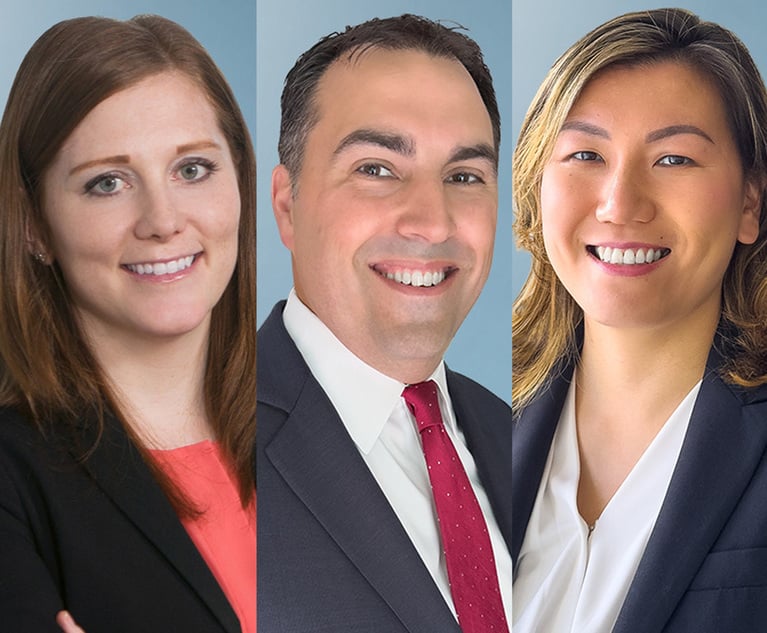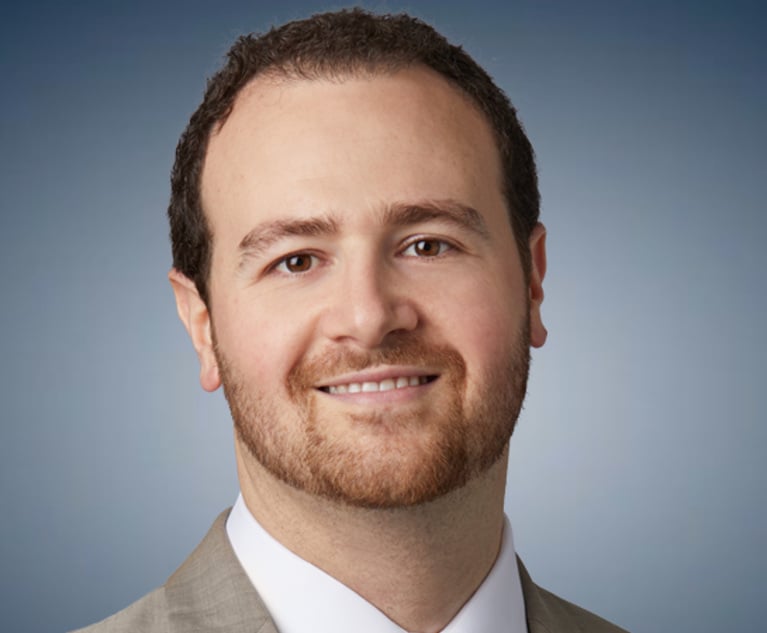 The Supreme Court Chamber in the Pennsylvania State Capitol building on July 5 in Harrisburg, Pennsylvania. Photo: Shutterstock
The Supreme Court Chamber in the Pennsylvania State Capitol building on July 5 in Harrisburg, Pennsylvania. Photo: ShutterstockIn Active Year, Justices Waded Into Thorny Debates, Issued Landmark Rulings
A big part of the Pennsylvania Supreme Court's job is to resolve heated debates—but this year, it seemed like those debates were more heated, more often than usual.
December 19, 2018 at 05:12 PM
6 minute read
A big part of the Pennsylvania Supreme Court's job is to resolve heated debates—but this year, it seemed like those debates were more heated, more often than usual.
It started early, with a nasty fight over congressional redistricting.
In a Jan. 22 ruling in League of Women Voters of Pennsylvania v. Commonwealth of Pennsylvania, a majority of the court, led by Justice Debra Todd, invalidated the Congressional Redistricting Act of 2011 as unconstitutional and gave the legislature and the governor until Feb. 15 to come up with a new districting plan, warning that if they failed to do so the court would take matters into its own hands to “proceed expeditiously to adopt a plan based on the evidentiary record developed in the Commonwealth Court.”
Todd and fellow Democratic Justices David Wecht, Christine Donohue, Kevin Dougherty and Max Baer were all in agreement that the congressional map in place at the time was unconstitutional. Justice Sallie Updyke Mundy and Chief Justice Thomas Saylor, both Republicans, dissented in full.
Baer, however, also issued a concurring and dissenting statement to argue against rushing to redraw the map ahead of the May primary.
The decision ultimately did fall to the Supreme Court, which issued a new congressional map Feb. 19. In its per curiam decision, the court said the map “draws heavily upon the submissions provided by the parties, intervenors, and amici.” The ruling again drew dissents from Saylor, Mundy and Baer.
The ruling, as predicted, did not sit well with Republicans in the legislature. In March, a dozen Republican lawmakers signed on to proposed legislation to impeach Todd, Wecht, Donohue and Dougherty, prompting a stern rebuke from Saylor. Ultimately, the impeachment measure never came to fruition.
But the Supreme Court was only just beginning its forays into polarizing legal and political topics.
In April, the court employed its very rarely-used King's Bench powers to grant embattled hip-hop star Meek Mill's request to be let out on bail and ordered that the trial judge expedite the case, which has come under national scrutiny as an example of the need for criminal justice reforms.
The rapper, whose real name is Robert Williams, had been on probation since 2008. Philadelphia Judge Genece Brinkley sentenced Williams in November to two-to-four years in prison after he was arrested twice in 2016 on charges that were later dropped. The sentence stunned both Williams' fan-base and criminal justice attorneys alike, since neither Williams' probation officer nor the prosecutor on the case had sought jail time.
The sentence brought Philadelphia into the national spotlight over issues about inequalities in the criminal justice system, and it also sparked a very public feud between Williams and Brinkley, with Williams accusing the judge of being enamored with him and alleging that the FBI had investigated her handling of the case.
Although Williams had repeatedly sought to have Brinkley removed from the case, the Supreme Court rejected that request, but said Brinkley “may opt to remove herself” from the case.
Another bid by Williams to have Brinkley tossed from the case made its way back up to the Supreme Court in August, but again it was rejected. The justices said Williams would have to bring his claims to the state Superior Court first.
About a year before it granted Williams' King's Bench petition, the Supreme Court had declined to grant such a petition seeking expedited review of the city of Philadelphia's highly controversial sweetened beverage tax.
But the justices got their chance to jump back into the fray this July, when an appeal from the Commonwealth Court's ruling upholding the tax made its way up to the Supreme Court in the usual course.
The tax was Philadelphia Mayor Jim Kenney's signature legislative effort, but it was met with challenges by several retailers and beverage distributors, who contended that it was a “power grab” by city officials and a violation of Pennsylvania's Sterling Act.
The high court ultimately agreed with the Commonwealth Court that the tax was legal, rejecting arguments that the levy improperly duplicated the state sales tax.
Later that same month, the state Supreme Court ruled to allow the Pennsylvania attorney general to release a redacted version of a widely anticipated grand jury report outlining decades of sexual abuse that occurred in Catholic dioceses across Pennsylvania. The justices further agreed to allow those challenging the full release of the report to argue their case before the high court in September.
The grand jury report was released in August, sparking a national debate about accountability for child sexual abuse, and leading several states and the U.S. Department of Justice to launch similar investigations. The Archdiocese of Philadelphia also established an out-of-court compensation fund for the victims of clergy sexual abuse, which is being overseen by a cadre of former government officials.
The issue of whether the names of clergy members included in the grand jury report should be made public was finally resolved in December, with the justices voting 6-1 that the report should remain redacted. The court cited the constitutional right to reputation and the separation of powers in reaching that determination.
In August, the Supreme Court ruled 5-2 to reverse a Commonwealth Court decision that struck down much of Gov. Tom Wolf's executive order creating a process for organizing home care workers.
The high court vacated the lower court's ruling, rejecting its finding that Wolf's order improperly gave direct-care workers the power to collectively bargain in contravention of the Pennsylvania Labor Relations Act and the Pennsylvania Employee Relations Act.
Wolf issued the executive order in February 2015, establishing an advisory group to manage the quality of long-term personal care services, and creating a process by which a representative of direct-care workers would be selected to meet with state officials to negotiate payment procedures and other working conditions. The order touched off a statewide debate over whether the arrangement created a de facto union. The high court said it did not.
And just before Thanksgiving, a six-justice high court unanimously reversed a controversial lower court ruling on data breach liability and in the process issued a landmark decision on cybersecurity law in Pennsylvania.
The Supreme Court ruled that companies have a common-law duty to protect their electronically stored employee data, reversing both an Allegheny County trial court ruling and a Superior Court ruling that tossed out a lawsuit against UPMC over a data breach that exposed the personal information of tens of thousands of current and former employees.
The high court has plenty more big cases teed up for 2019. We'll take a look at the issues the justices will be tackling in the new year in an upcoming piece.
This content has been archived. It is available through our partners, LexisNexis® and Bloomberg Law.
To view this content, please continue to their sites.
Not a Lexis Subscriber?
Subscribe Now
Not a Bloomberg Law Subscriber?
Subscribe Now
NOT FOR REPRINT
© 2024 ALM Global, LLC, All Rights Reserved. Request academic re-use from www.copyright.com. All other uses, submit a request to [email protected]. For more information visit Asset & Logo Licensing.
You Might Like
View All
Immunity for Mental Health Care and Coverage for CBD: What's on the Pa. High Court's November Calendar
5 minute read
Rule 126(b) Citations to Unpublished Opinions: Some of Us Still Don’t Get It
6 minute read
Proposed 'Bulk Sensitive Personal Data' Rule and the DOJ’s Comprehensive National Security Regulations
7 minute read
The Importance of Plaintiffs Not Letting Defendants Dictate Settlement Tax Strategies
9 minute readTrending Stories
Who Got The Work
Michael G. Bongiorno, Andrew Scott Dulberg and Elizabeth E. Driscoll from Wilmer Cutler Pickering Hale and Dorr have stepped in to represent Symbotic Inc., an A.I.-enabled technology platform that focuses on increasing supply chain efficiency, and other defendants in a pending shareholder derivative lawsuit. The case, filed Oct. 2 in Massachusetts District Court by the Brown Law Firm on behalf of Stephen Austen, accuses certain officers and directors of misleading investors in regard to Symbotic's potential for margin growth by failing to disclose that the company was not equipped to timely deploy its systems or manage expenses through project delays. The case, assigned to U.S. District Judge Nathaniel M. Gorton, is 1:24-cv-12522, Austen v. Cohen et al.
Who Got The Work
Edmund Polubinski and Marie Killmond of Davis Polk & Wardwell have entered appearances for data platform software development company MongoDB and other defendants in a pending shareholder derivative lawsuit. The action, filed Oct. 7 in New York Southern District Court by the Brown Law Firm, accuses the company's directors and/or officers of falsely expressing confidence in the company’s restructuring of its sales incentive plan and downplaying the severity of decreases in its upfront commitments. The case is 1:24-cv-07594, Roy v. Ittycheria et al.
Who Got The Work
Amy O. Bruchs and Kurt F. Ellison of Michael Best & Friedrich have entered appearances for Epic Systems Corp. in a pending employment discrimination lawsuit. The suit was filed Sept. 7 in Wisconsin Western District Court by Levine Eisberner LLC and Siri & Glimstad on behalf of a project manager who claims that he was wrongfully terminated after applying for a religious exemption to the defendant's COVID-19 vaccine mandate. The case, assigned to U.S. Magistrate Judge Anita Marie Boor, is 3:24-cv-00630, Secker, Nathan v. Epic Systems Corporation.
Who Got The Work
David X. Sullivan, Thomas J. Finn and Gregory A. Hall from McCarter & English have entered appearances for Sunrun Installation Services in a pending civil rights lawsuit. The complaint was filed Sept. 4 in Connecticut District Court by attorney Robert M. Berke on behalf of former employee George Edward Steins, who was arrested and charged with employing an unregistered home improvement salesperson. The complaint alleges that had Sunrun informed the Connecticut Department of Consumer Protection that the plaintiff's employment had ended in 2017 and that he no longer held Sunrun's home improvement contractor license, he would not have been hit with charges, which were dismissed in May 2024. The case, assigned to U.S. District Judge Jeffrey A. Meyer, is 3:24-cv-01423, Steins v. Sunrun, Inc. et al.
Who Got The Work
Greenberg Traurig shareholder Joshua L. Raskin has entered an appearance for boohoo.com UK Ltd. in a pending patent infringement lawsuit. The suit, filed Sept. 3 in Texas Eastern District Court by Rozier Hardt McDonough on behalf of Alto Dynamics, asserts five patents related to an online shopping platform. The case, assigned to U.S. District Judge Rodney Gilstrap, is 2:24-cv-00719, Alto Dynamics, LLC v. boohoo.com UK Limited.
Featured Firms
Law Offices of Gary Martin Hays & Associates, P.C.
(470) 294-1674
Law Offices of Mark E. Salomone
(857) 444-6468
Smith & Hassler
(713) 739-1250





